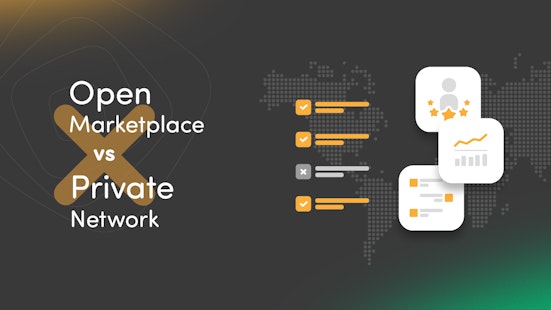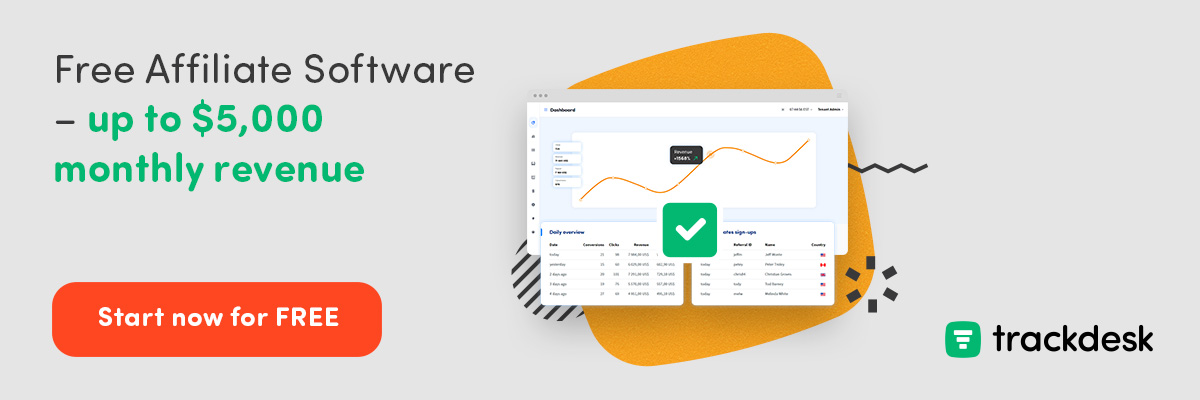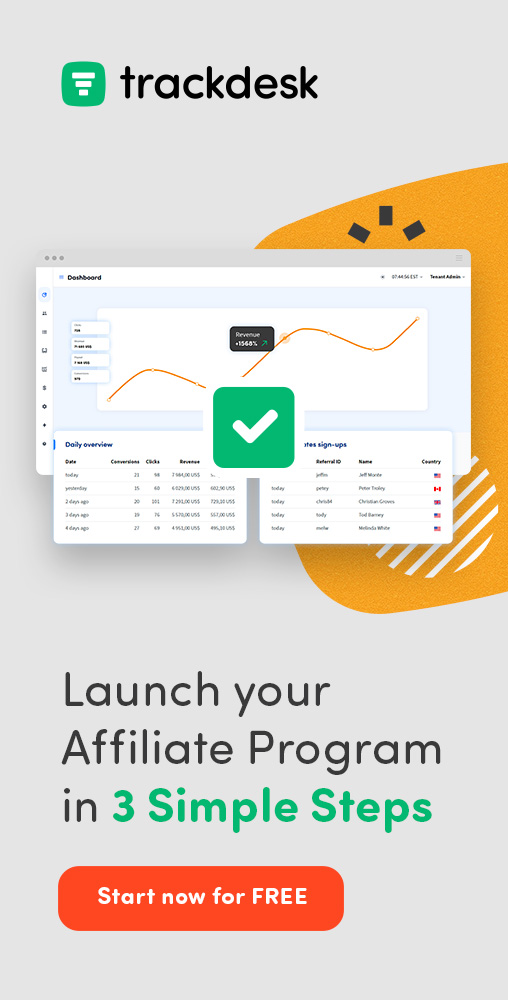
Open Marketplace vs Private Affiliate Network: Which is Better?
Learn the difference between an open marketplace and a private affiliate network. Discover which has the best benefit for your business in this article.
Learn the difference between an open marketplace and a private affiliate network. Discover which has the best benefit for your business in this article.
Over 83% of marketers are using affiliate marketing programs to increase brand awareness, and this figure is expected to grow by 7.7% CAGR from 2022 to 2030. Small businesses increasingly turn to this marketing strategy because it's easy to implement, accessible, and affordable. You can start your own affiliate marketing program even with limited resources. With Trackdesk you can start establish your partnership revenue stream with $0 upfront costs.
Starting an affiliate marketing program is easy but entails making several decisions. You need to determine the rewards you'll offer, how to attract affiliates, the tools you'll use, and the commission rates you'll give.
One of the major decisions you'd make is whether to take your program public or private. Are you joining a public affiliate network or building your own private affiliate network? Affiliate networks are the bridge that links your affiliate program to potential affiliates. This is how you'll manage the program and track how affiliates promote your products or services. Alternatively, affiliate software can help you monitor and engage with your affiliates.
What are the advantages of using affiliate software instead of an affiliate network?
Affiliate tracking software lets you work independently using automated tools to help you find and attract affiliates that are right for your brand. While you have to do this on your own, the software helps with affiliate engagement.
Advantages of Affiliate Software
- Full Control: Affiliate software allows you to find and choose your affiliate partners however you like. It gives you the freedom to register and manage your affiliates, as well as choose your communication style for each affiliate. It also lets you build relationships with them without the restrictions of third-party networks. Similarly, having complete control means having full access to the organic data the software collects and makes affiliate monitoring easier.
- Customisation Options: Affiliate software breaks the mould of network standards through customisation. You can adjust structures in your program however you deem appropriate, letting you choose how to pay your affiliates and build a system that works best for you and your partners. You can also create a more personalised reward structure and special incentives. Customisation also includes integrating with other essential eCommerce platforms, payment gateways, and other important tools like CRM and email marketing.
- Flexibility: Unlike crowded affiliate marketers—with every business vying for the attention of top affiliates—affiliate software has less competitive pressure. There's no centre hub where you have to compete with others. This means you can have more flexible and sustainable commission rates. Without the "peer pressure," you don't have to outbid others for affiliate attention.
- Cost-Effective: Affiliate networks generally charge initial fees and a finder's fee for every affiliate sale. These extra charges can accumulate, taking a huge chunk of your profit margin. Affiliate software doesn't have extra fees, so it's more cost-effective. Some affiliate software, like trackdesk, provides a better pricing structure. It has a fair pricing policy and is free until you hit $5,000 monthly revenue.
On the other hand, Affiliate networks and software are tools for growing your affiliate program. Affiliate networks link businesses with affiliates, like content creators and influencers, who are already interested in your industry or niche. Furthermore, affiliate networks host your program, so expect a ton of competition. Below are the pros and cons of private and open affiliate networks.
What are Private Affiliate Networks?
Private affiliate networks, also called proprietary affiliate pools, are a great alternative to joining open affiliate marketplaces. These exclusive networks are established by brands, who can select the affiliates to work with based on specific criteria and manage them with dedicated affiliate tracking software.
Affiliates go through a screening process to ensure you get a higher quality of promoters. You can control these criteria and change them at any time. Most affiliates get an invitation to join your program, and they view this as working "directly" with the brand.
Advantages of Private Affiliate Networks
- High-quality affiliates: One of the biggest benefits of an "invitation-only" affiliate program is working with the cream of the crop. Only a small percentage of affiliates drive any substantial revenue for your business, and you're better off working with a few of these people than wasting time with thousands who produce mediocre results.
- Personalised deals: Talented affiliates want to work with brands that value their potential. Since you're dealing with a smaller pool, you'll have enough time and resources to learn about your affiliates' audiences and can offer them better promotion deals that are guaranteed to convert customers.
- High engagements: Affiliates who know they've been invited to an exclusive program feel extra special that their efforts were recognised. This will propel them to do their best to promote your offers and be extra committed to delivering results. This leads to better conversions and a win-win scenario for the brand and the affiliate.
- Easier to manage: With a smaller pool of affiliates, you don't have to waste time dealing with dozens of low-quality affiliates who consume the same resources but deliver minimal results. You can also test new programs quickly with a smaller pool before launching them to a bigger audience. Make sure to pick one the best affiliate tracking software.
- Lower costs: With a private network, you can skip the hefty vendor and commission fees charged by public networks. It's like eliminating the middleman since you'd work directly with your affiliates.
- Data ownership: Building a proprietary affiliate pool gives you direct access to the data surrounding your entire affiliate marketing program. This allows you to refine your strategy and improve its performance. With reliable affiliate software you will be able to analyse the data and optimise your efforts in real time.
Drawbacks of Private Affiliate Networks
While it has more benefits than public affiliate networks, there are also cons to consider for private affiliate networks.
- Time investment: At the onset, you won't have access to a large pool of affiliates eager to sign up. You'll send exclusive invites to top influencers and slowly build your affiliate pool. This can be a time-consuming endeavour but one that pays off as a long-term investment.
- Higher internet involvement: Building a proprietary affiliate network is not a set-and-forget strategy. Gaining direct access to influencers requires substantial effort to keep the program running, manage their expectations, and build relationships.
- Limited growth: Because you're already working with the cream of the crop, finding those budding and diamond-in-the-rough influencers can be tough. You'll always be limited to working with those with a track record of proven success.
- Reluctant affiliates: Some affiliates may question why you're running a private program instead of a public one. They may feel that you can pull the plug anytime, not track their sales properly, or worse, not pay their commissions. Creating a credible brand will assure affiliates and get them fully on board. Once you have a good pool, you can leverage this to attract other top-notch influencers.
What is an Open Affiliate Marketplace?
Open affiliate marketplaces are also called public affiliate programs because they are open to the public. Anyone who meets the basic requirements can apply and join these affiliate companies. Sometimes, individuals can even become affiliates without first proving that they have an audience and are generating valuable traffic.
There are many large open affiliate marketplaces where thousands of publishers and affiliates compete for each other's attention. These are reputable platforms, but the same can't be said for the affiliates or publishers on their sites. Because it's so easy to build or join a program in these networks, it's also easy for less reputable parties to operate.
Advantages of Open Affiliate Marketplaces
Several advantages make open affiliate marketplaces popular with small and large businesses. These are:
- Huge diversity: You can tap a broad range of affiliates and can definitely find willing partners who will resonate with your brand and promote your products.
- Easy entry: Affiliates can quickly join your program and promote your products without extensive vetting. This keeps your program up and running in no time, leading to faster results.
- Increased exposure: Your brand benefits from increased awareness since your offers are presented to a larger pool of affiliates.
- Cost-effective: Most open marketplaces operate on a performance-based model, so you'd only pay affiliates for successful conversions.
Drawbacks of Open Affiliate Marketplaces
Despite the advantages, there are also several drawbacks that you should seriously consider before going the easy route.
- Lack of control: You only have limited control over the quality and methods of promotions used by your affiliates. You also don't have a lot of visibility into deeper metrics, which can make it feel like you don't completely own the data related to your campaigns.
- Low-quality affiliates: While not always true, there's a huge probability that you'll get lower-quality affiliates. There will also likely be more fraudsters who may trick you and try to earn commissions through ill means.
- Increased competition: With numerous products and programs available, yours may get lost in the crowd, making it challenging to stand out. If you don't create a compelling offer, or if your brand is not too popular, affiliates may bypass your offer and go for better-known brands.
- High commission fees: Open marketplaces may charge additional fees, affecting your overall profit margins. In most cases, they pay affiliates only a small percentage of these fees and pocket the rest.
- High setup fees: While they're easy to set up, open marketplaces may charge anywhere from $5,000+ just to help you set up your program. The setup may be quick and easy, but it isn't free.
- Lock-in contract: Most open marketplaces require a long-term commitment, making them inflexible if you want to change networks. You'd be forced to finish the commitment; otherwise, you'd lose whatever setup costs you'd paid.
- Lacks relationships: Affiliates and publishers don't have direct access to each other, making it hard to form actual relationships or long-term sustainable partnerships. Affiliates may also be less invested in your brand since they only view you as a means to an end.
- Lacks knowledge: Affiliates may not develop sufficient product knowledge of your brand. This can make them less effective at promoting your product, resulting in missed sales opportunities.
If you think these drawbacks are a deal breaker, you may want to consider a better option – building a proprietary affiliate pool. You don't need complicated tools or extensive knowledge of affiliate marketing to start your own proprietary affiliate pool. With the right partner, you can be up and running in no time.
Trackdeck's Partnership Managers Marketplace gives you access to experts who can help establish your proprietary affiliate pool. They can define your strategy, promote your program, and find the right affiliates. Even if you have little to no knowledge of building an affiliate marketing program, you can lean on these experts for step-by-step guidance and support.
Side-by-Side Comparison: Open Affiliate Marketplace vs Private Affiliate Networks
To help you decide better, here's a side-by-side comparison of these two types of affiliate networks.
|
Open Affiliate Marketplace |
Private Affiliate Network |
|
Pool of Affiliates |
A broad and diverse pool of affiliates |
Limited and exclusive network of affiliates |
Who can join? |
Anyone can join. The program is open to the public |
Only invited affiliates can join the program |
Quality of Affiliates |
Often include low-quality affiliates with the occasional diamond-in-the-rough. |
Only includes high-quality and proven to be successful affiliates. |
Start-up Costs |
High start-up costs |
Low start-up costs |
Setup Speed |
Quick and easy to setup |
Time intensive to build your own pool |
Program Control |
Low – you don't dictate the selection process or how affiliates market your products |
High – you have a clear say on how affiliates are chosen and can personalise promotions to match their audiences |
Success Rate |
Lower chances of success unless you can stumble on several rising stars |
Higher chances of engagement and conversions since affiliates are more motivated to promote your products |
Risk of Affiliate Fraud |
High due to higher instances of low-quality affiliates |
Low due to the exclusive selection process |
Building Proprietary Affiliate Pool with Affiliate Tracking Software vs. Open Affiliate Marketplace
Now that you know the difference between an open and building your own affiliate network with dedicated affiliate software, you must be asking how to choose the right one for your needs. To help you decide, consider the following questions:
What's your goal for your affiliate marketing program?
Do you want quick results and as much traffic as possible, regardless of whether they convert? If yes, then go for a public network. Otherwise, go for a private network if you're prepared to be in it for the long haul and build a steady but quality affiliate pool.
Do you have a very specific niche or a broad one?
If you're selling niche products, you may benefit more from finding the few credible influencers serving your market. Although they serve a diverse affiliate pool, most public affiliate networks are better for brands in broad categories since they can attract a more substantial number of affiliates.
How are your resources? What's your budget and time commitment?
Your resources will determine whether you can afford both networks or stick to one. Ideally, you should be able to enjoy the best of both worlds, but pursuing two types of affiliate networks is time and budget-intensive. Use a proprietary affiliate pool if you have a limited budget but can commit the time. Your time investment will pay off huge dividends in the long term.
Build A Proprietary Affiliate Pool with trackdesk
There are good influencers, and there are great ones. It's known that 99% of influencer revenue is generated by 1% of influencers. These are the great influencers you want to associate with your brand.
However, you can't find them in any open affiliate network. They prefer to work directly with companies who see the value of their services. If you are serious about business growth, you're better off attracting these top-notch influencers and building an affiliate program they'd be privileged to join.
Create your proprietary affiliate pool to take full control of your affiliate program. trackdesk gives you the tools to grow your affiliate revenue stream as quickly as 1-2-3. With trackdesk, you can build your own affiliate network and add unlimited affiliate partners, enjoy free CPA, CPS & CPL tracking, and get free Wise & PayPal automated payouts.
Moreover, building a proprietary affiliate pool is a breeze, thanks to the Partnership Managers Marketplace. You won't have to do everything yourself. You can find the right person to help build your private network and increase your chances of success.
Kickstart your affiliate program for free. Sign up with trackdesk today.

I have a passion for storytelling. I believe that a good story delivers value while capturing, influencing, and sustaining its intended audience. This has always been, and always will be, my primary aim as a writer.


